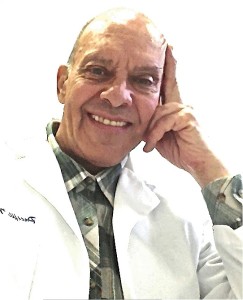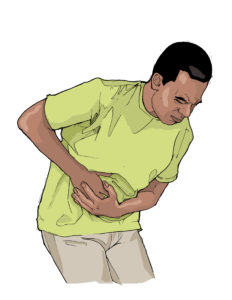The two most common complaints we see in our office are fatigue (lack of energy) and digestive disturbances.
We’ve talked about fatigue in several previous newsletters (see the newsletter archive).
Let’s start with the digestion basics.
Digestion has two distinct parts: mechanical and chemical.
Mechanical digestion takes place in the mouth – it starts as soon as you take the first bite of a meal. Chewing breaks the food into pieces that facilitate the chemical side of the process.
Saliva begins the chemical process of breaking down food so that your body can absorb and use it.
As the food passes through the GI tract, it mixes with digestive juices that break large food molecules into smaller molecules.
The body absorbs the molecules through the walls of the small intestine, where they enter the bloodstream, to be delivered to the rest of the body. After the nutrients have been extracted, the waste is eliminated.
Simple enough – yes?

Then why do so many of us experience symptoms of disturbed digestion: acid reflux, heartburn, nausea, vomiting, diarrhea, constipation, gallstones, belching, burping, flatulence, abdominal pain, hemorrhoids?
Why do we have so many digestion-related diseases: gastric and duodenal ulcers, GERD, celiac disease, diverticulitis, irritable bowel syndrome, ulcerative colitis, and Crohn’s?
If only it were simple – in fact, there are as many answers as there are people with these ailments. That’s because each person’s digestive tract is highly individual.
Fortunately, we have tests and tools that we can help us root out the cause and choose a course of treatment.
In last week’s article, Dr. Connie mentioned the Comprehensive Stool Analysis Profile (CSAP) and other tests that we use to evaluate digestive function and biochemistry.
I’d like to offer you some practical suggestions that I believe will help you maintain your digestive health.
Choose whole, unprocessed foods. When it comes to food choices, the body understands “simple” but can become thoroughly confused by complex “gourmet” combinations.
Identify and eliminate food allergies. At Pacific Naturopathic we’re equipped to help you identify any immunological or functional food allergies and sensitivities that may be giving you problems, through testing and elimination/challenge methods.
Treat infections or overgrowths of “bad bugs.” The CSAP panel will shed light on your specific gut biome, including the state of friendly bacteria, pathogenic bacteria, and yeast. The CSAP will also suggest treatment options.
Replenish your digestive enzymes. The unfortunate fact is that as we age, our capacity to produce digestive enzymes diminishes.
Rebuild your inner forest of friendly bacteria. Probiotics can be soothing and restorative, but with so many alternatives on the market, which specific flora do YOU need? The CSAP can give us answers.
Heal your gut lining. Repairing the gut is a complex, multi-factor process that takes time and careful attention. The CSAP and other tests can help us determine which approach will be best for you.
 Know your “digestive triggers.” The specific nutritional and environmental triggers for digestive upset vary from person to person.
Know your “digestive triggers.” The specific nutritional and environmental triggers for digestive upset vary from person to person.
An easy way to identify the foods that upset your digestion is by keeping a food journal. In the journal, record all of the foods and beverages you eat, as well as any medications and supplements you’re taking. Also, note your moods, sleep quality, and digestive function.
Do certain situations seem to trigger your digestive problems? Does travel make you unravel? Are menstrual hormones wreaking havoc with your digestion?
If you suspect a connection, plan your days so that you can anticipate, avoid, or prepare for the tricky situations.
Manage stress for a peaceful inner world. Does stress seem to ignite or aggravate your digestive problems? (Frequent digestive flare-ups, of course, only add to the stress in your life.) You may be able to relieve the stress by relaxing with exercise, meditation, yoga, and hobbies.
Finally, beware of hucksters promising miracle cures for your digestive problems. If there’s one thing we can count on today, it’s that any medical condition that presents treatment difficulties is bound to generate an industry that aims to capitalize on our anxiety and pain.
Many of the purported miracle cures are expensive, ineffective, or downright dangerous. While digestive complaints may be amenable to simple therapies, the opposite may also be true. There are hundreds of potential causes for the pain in your gut, some of them quite serious. Our best recommendation is to give us a call. Let’s talk about scheduling a CSAP panel before you consider starting on alternative therapies or supplements.
For more on Dr. Marcel’s work click HERE.

